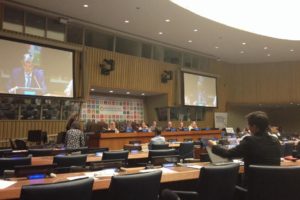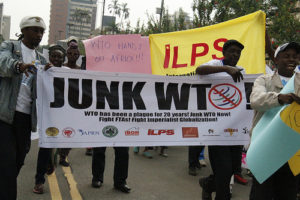Below are the transcripts of the intervention made by Mr. Paul Quintos and Miss Tessa Khan of the Asia Pacific Women on Law and Development (APWLD)at the Interactive Stakeholder Dialogue at the Joint Financing for Development and Post-2015 Processes.
______________________________________________________________________
Statement by Mr. Paul Quintos
(IBON International, Campaign for Peoples Goals, Asia-Pacific RCEM and CSO Partnership for Development Effectiveness)
23 April 2015
Thank you Chairs for this opportunity to address this session.
First of all I would like to emphasize at the outset that for us in civil society the matter of follow-up and review is about ensuring development justice and the accountability of our governments, international institutions and other powerful actors for the impacts of their policies and practices on our lives and our futures.
That said, we are deeply concerned that in both the Zero Draft of the FFD as well as in the OWG report, there appears to be a strong trend towards ‘outsourcing’ government responsibilities for the MOI of sustainable development to the private sector. This is especially problematic given the difficulties associated with private sector accountability resulting from weak or non-binding regulatory frameworks and the transnational nature of much of private finance and investments.
We are particularly concerned about the prominent role given to private finance in the zero draft and to public-private partnerships (PPPs) in the SDGs. Private finance is profit-oriented and tends to invest with short-term horizons, which tends to be incompatible with the equitable provision of public goods, such as social services. Further, modalities for private financing such as blended financing and PPPsincrease public debt burdens and shift risks to the public sector while privatising profits.
The World Bank’s Independent Evaluation Group (IEG) points to major problems with PPPs, namely: a) increased costs to the public purse; b) lack of transparency and accountability; and c) high-risks which end up shouldered by the public. Other studies point out that publicly-subsidized private finance and PPPs tend to go to well-performing sectors anyway and thus have questionable development additionality.
Therefore, instead of merely “inviting” business to voluntarily apply socially and environmentally responsible principles, we urge member states to:
- Commit adequate public financing for public goods and services,and ensure that essential public services, like healthcare, education, housing, and water and sanitation, remain exclusively under public control.
- Adopt national-level regulations that prevent the extraterritorial infringement of human rights by the business sector.
- At the UN level, establish an open, transparent and participatory intergovernmental space for oversight, monitoring and review of any global partnership developed with the express purpose of contributing to the attainment of SDGs. Such an intergovernmental mechanism must include measures for ex-ante and periodic assessments based on existing UN principles on business and human rights, environment and development effectiveness, and utilizing information provided by governments as well as civil society and other independent sources.
- Engage constructively in the development of an international legally binding instrument on Transnational Corporations as mandated by the Human Rights Council resolution last June 2014.
Thank you.
Statement by Miss Tessa Khan
(APWLD)
I’m speaking today on behalf of the Asia Pacific Forum on Women, Law and Development and the Women’s Major Group, and the Women’s Working Group on FfD.
In both the financing for development negotiations and the post-2015 development process, attention is given to trade policies as an instrument for sustainable development, both within the World Trade Organisation and preferential trade and investment agreements. The question of how to align those policies with our objectives here requires us to urgently re-order the hierarchy of obligations to which many Member States currently subscribe. It is a question of policy coherence at its most stark.
The ability of governments to regulate in the interests of sustainable development, gender equality, and the human rights obligations by which they are legally bound continues to be eroded by preferential agreements that cover vast amounts of global trade. These agreements, including the Trans Pacific Partnership which would cover one third of global trade, have moved far beyond lowering traditional trade barriers and into regulation of key areas of public policy; regulation that is frequently backed by procedurally suspect investor-state dispute settlement that result in multimillion-dollar awards against governments attempting to regulate in the public interest. The level of bias and procedural unfairness within this dispute settlement system has led even leading international arbitrators to call for its overhaul.
Among recent cases brought in this system are challenges to Egypt’s attempt to increase the minimum wage, and El Salvador’s right to keep drinking water sources unpolluted by extractive industry.
Is this the meaningful trade liberalisation that supports sustainable development referred to in the FfD zero draft? Will trade provide financing for development when Ecudaor is asked to pay more than $2 billion dollars—half of its public health budget—to a mining company? Is trade liberalisation meaningful when social inequalities like the gender pay gap and poor labour conditions are treated as a source of competitive advantage within global value chains? When multinational companies displace and receive more favourable tax treatment than women engaged in small-scale cross-border trade? Or when it entrenches commodity-based export patterns that destroy the environment, displace communities and undermine sustainable industrial policy?
The FfD zero draft rightly calls for the proper review of investor-state dispute settlement clauses and the need to ensure preferential trade agreements are negotiated transparently, and do not undermine sustainable development. This commitment is necessary not only as a matter of policy, nor only as a matter of development justice to redress the imbalance between corporate and public power. It is necessary to fulfil governments obligations under international law, in which their duties to fulfil human rights without discrimination prevail.



